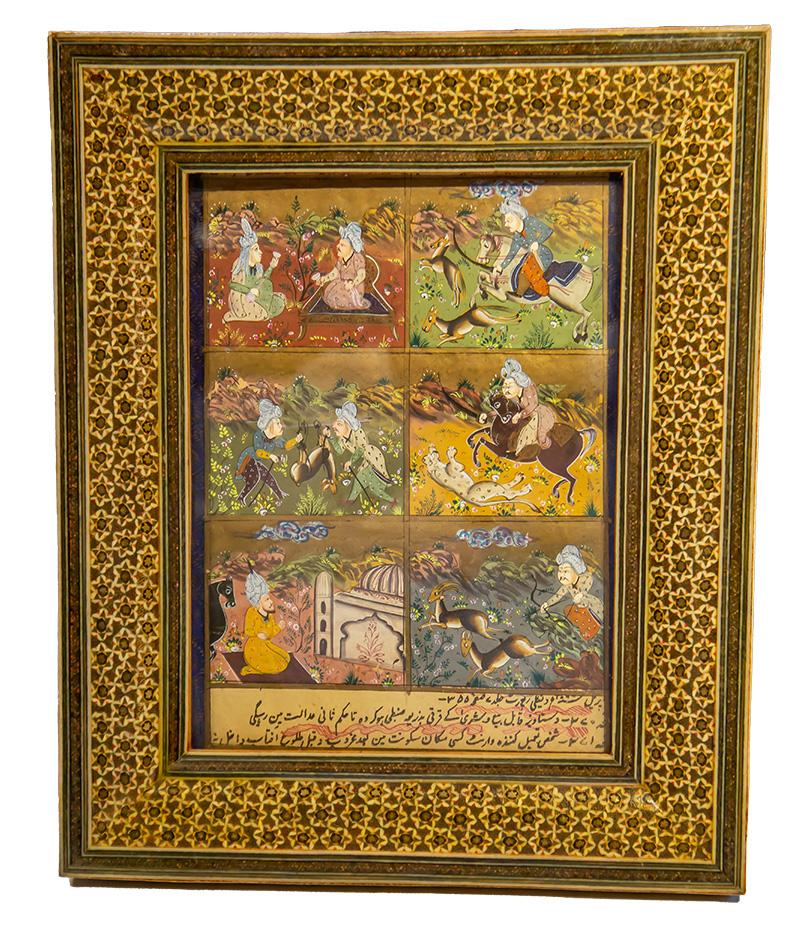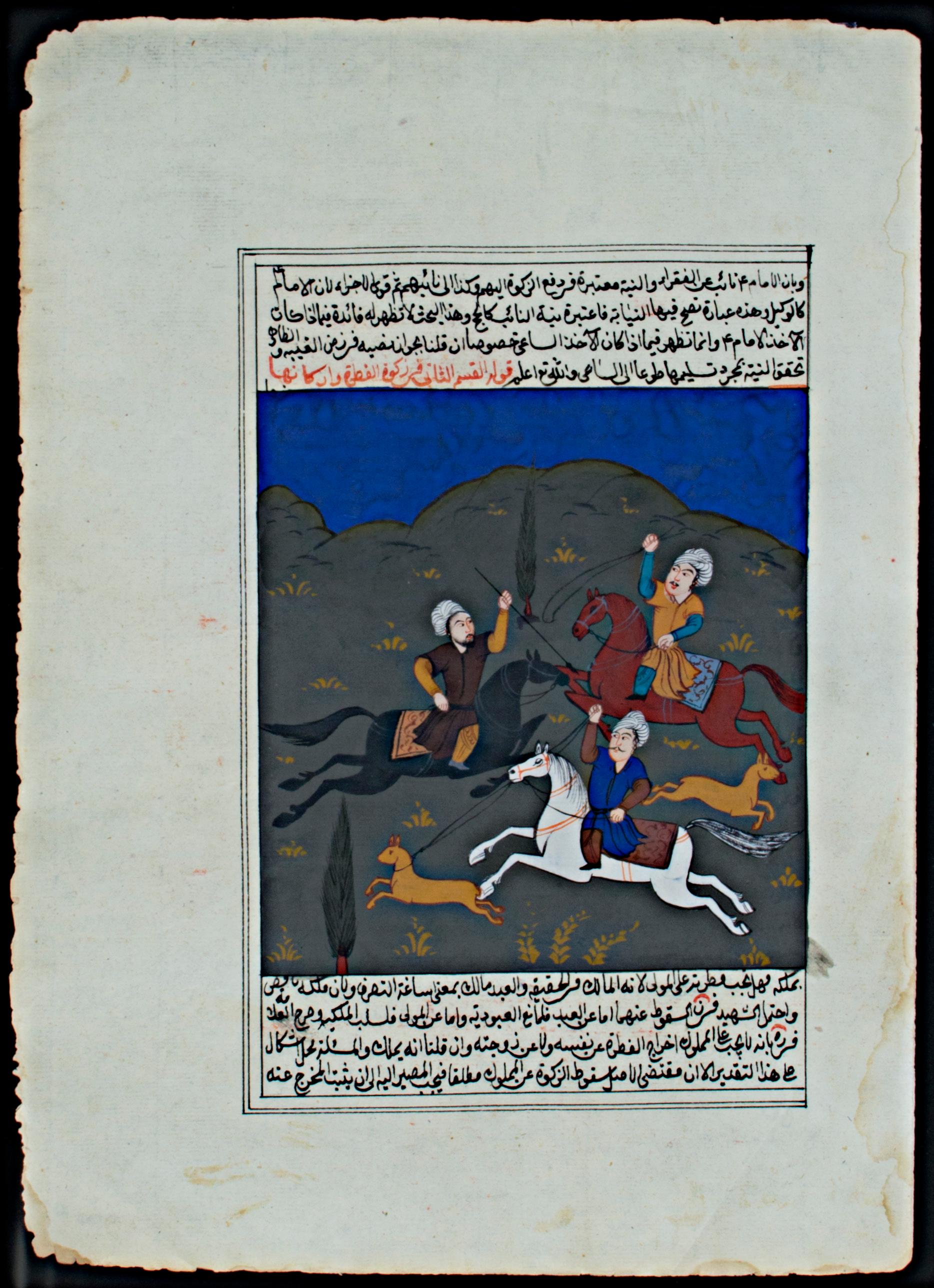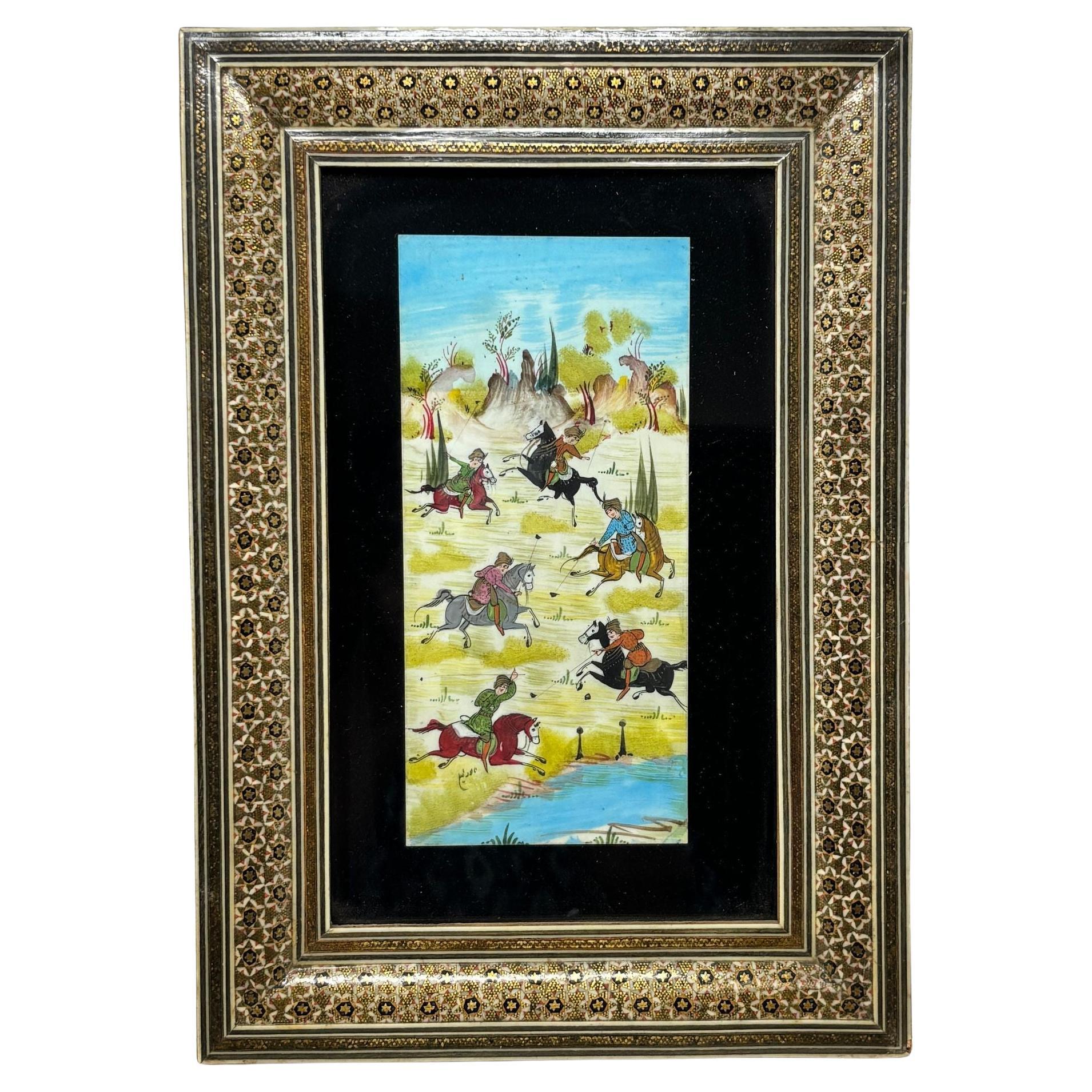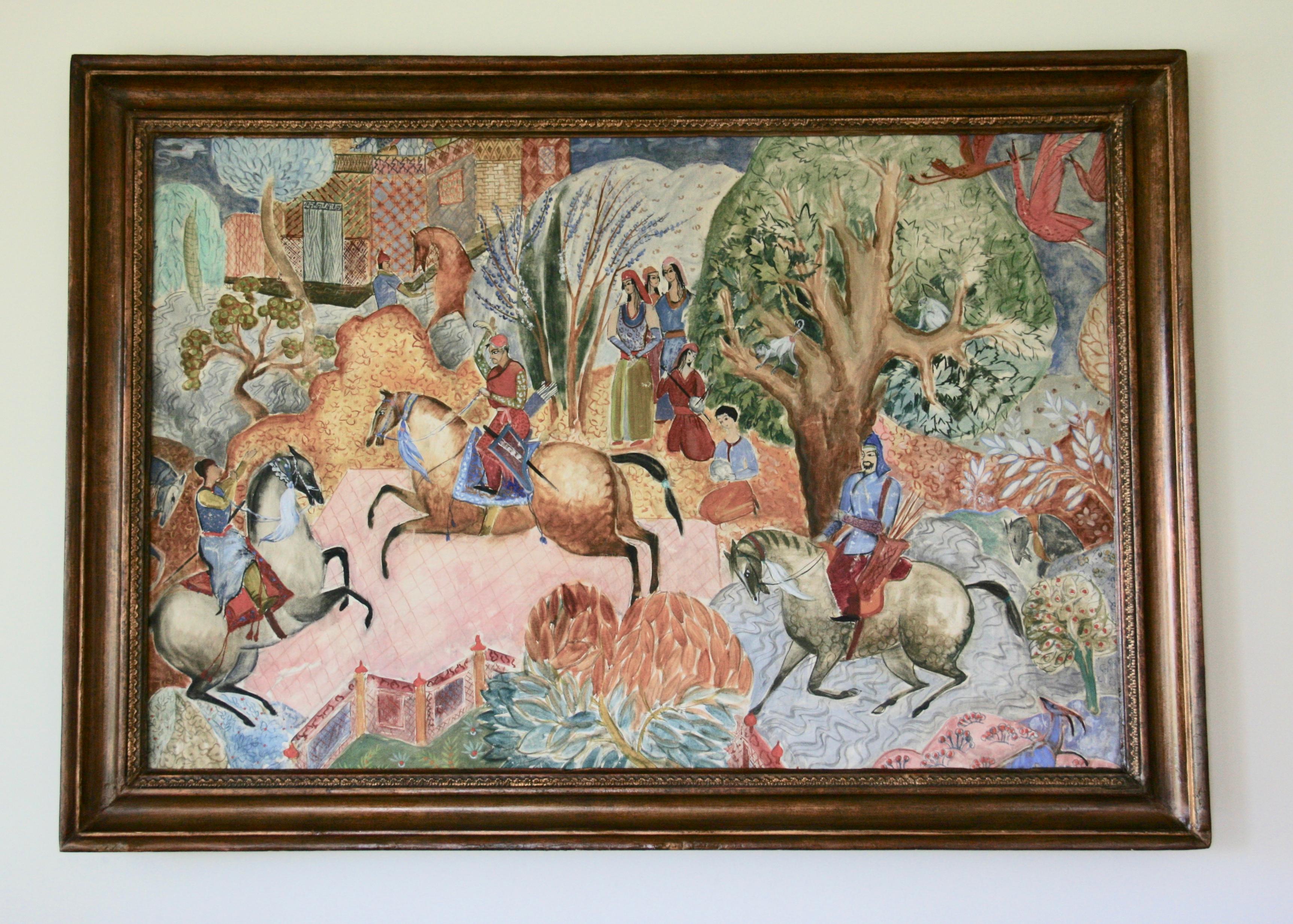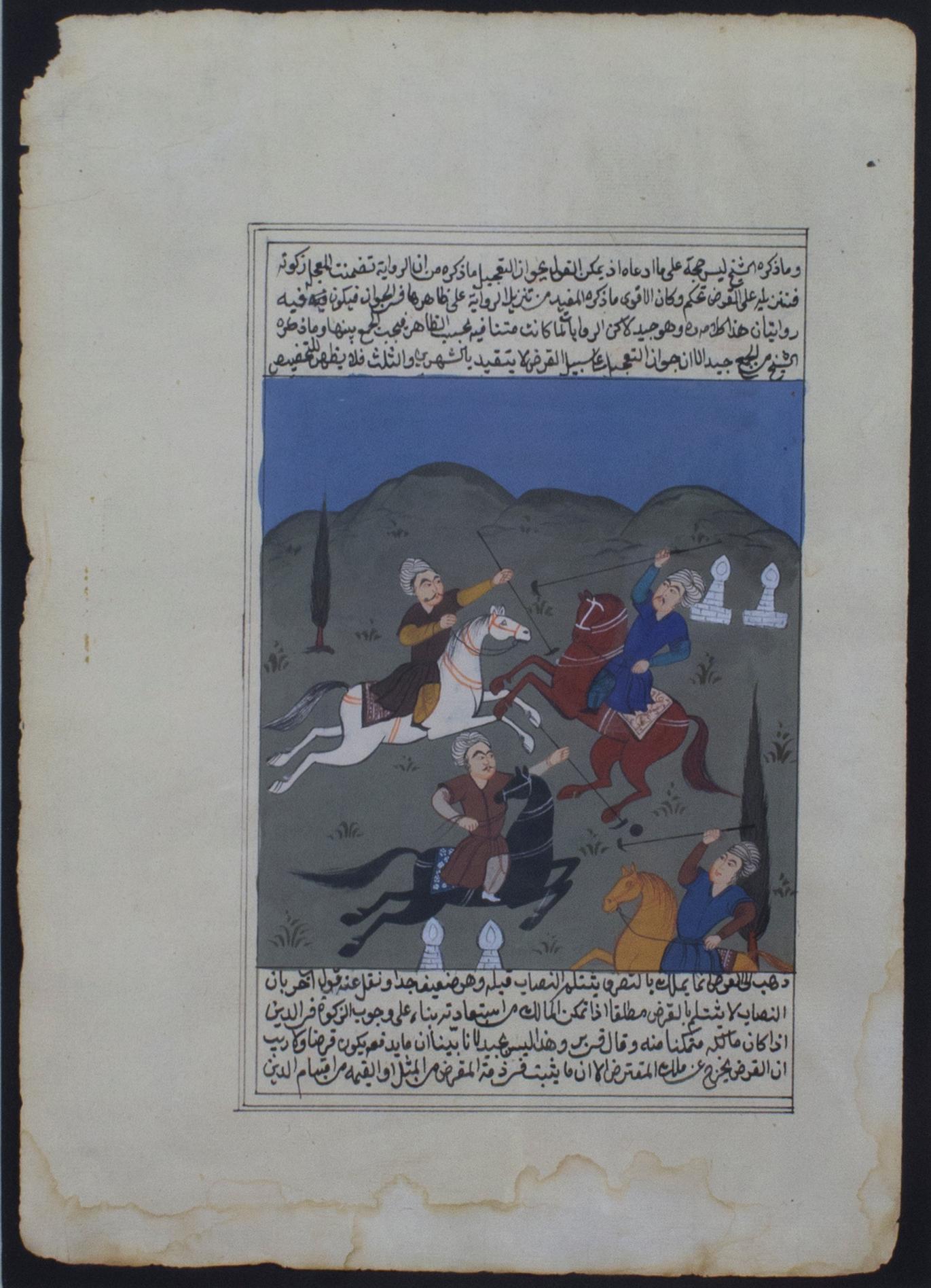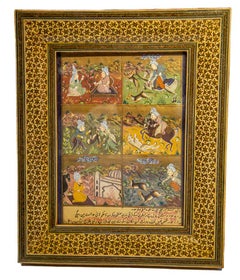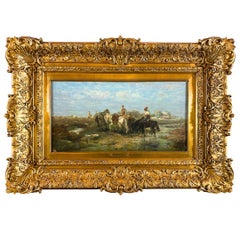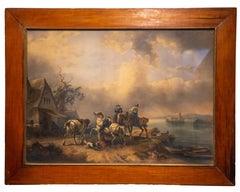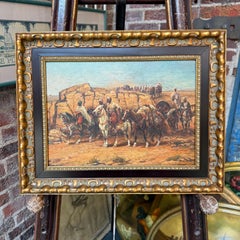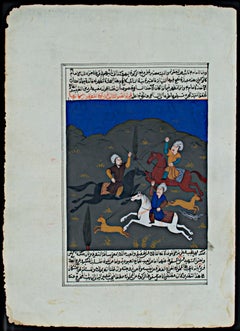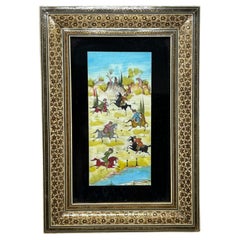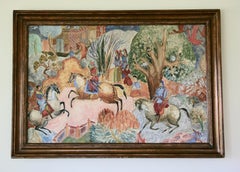Items Similar to Vintage Miniature Persian Painting of Hunters on Horseback
Video Loading
Want more images or videos?
Request additional images or videos from the seller
1 of 15
UnknownVintage Miniature Persian Painting of Hunters on Horseback
$2,150
£1,647.44
€1,894.94
CA$3,073.72
A$3,338.62
CHF 1,767.52
MX$40,311.73
NOK 22,065.67
SEK 20,903.72
DKK 14,149.40
About the Item
A miniature antique Indo Persian Mughal Art mixed media painting on paper depicting a hunting scene in a landscape painted in bold colors and with fine details with a background of colorful mountains, blooming trees and Cypress trees. Antique Miniature Persian Paintings, Wall Art, Home Decor, and Collectibles. One of a kind artwork.
This beautiful work of art is framed in a handmade Khatam Frame, which is a delicate wood inlaid work
27964-LU2595214974362
- Dimensions:Height: 14 in (35.56 cm)Width: 11 in (27.94 cm)Depth: 2 in (5.08 cm)
- More Editions & Sizes:signedPrice: $2,150
- Medium:
- Period:
- Condition:This piece and the accompanying frame are in GOOD Condition and deserve to be in the collection of an owner who truly appreciates them. We welcome all inquiries regarding design, construction, and condition.
- Gallery Location:Jacksonville, FL
- Reference Number:Seller: 279641stDibs: LU2595214974362
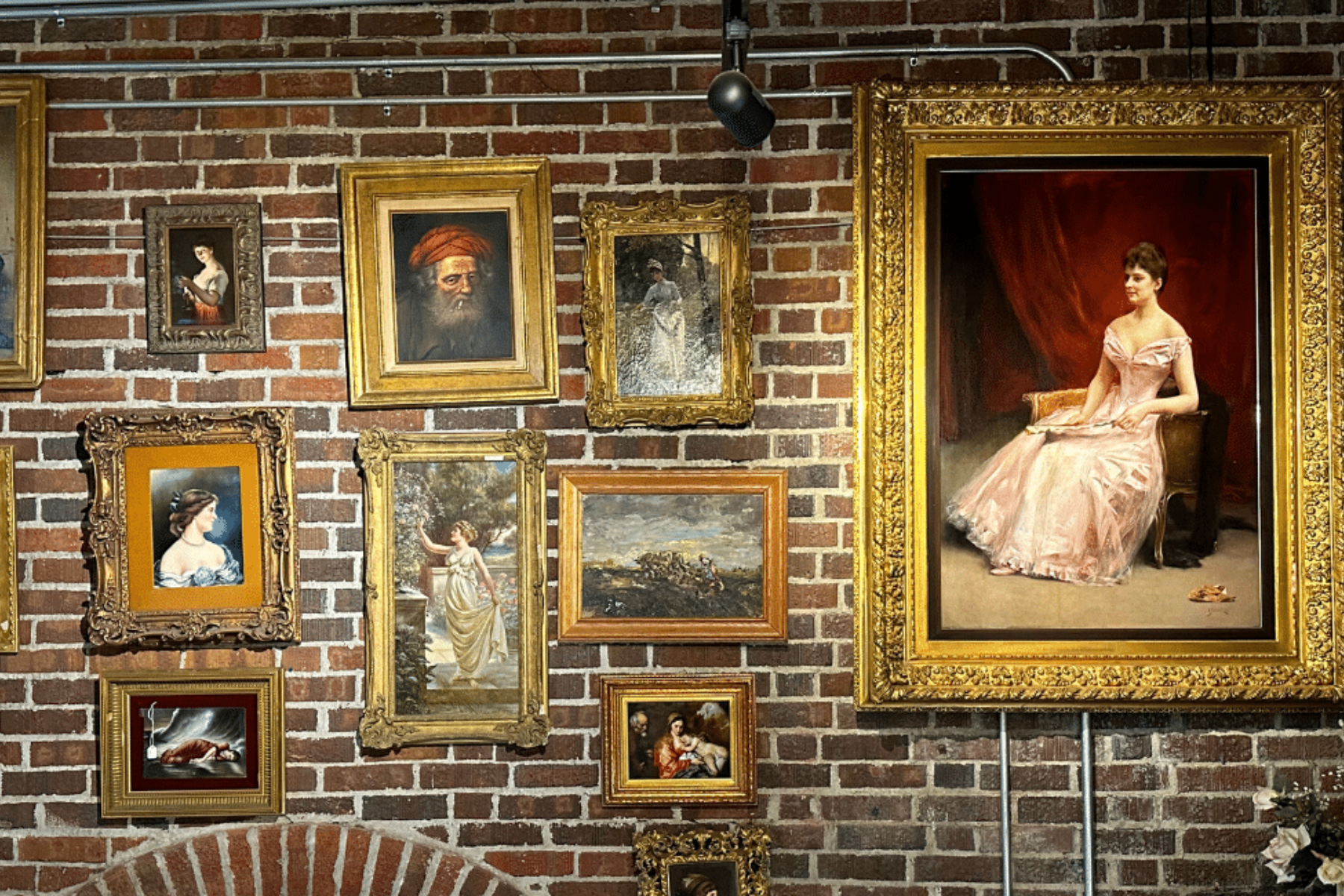
About the Seller
No Reviews Yet
Vetted Professional Seller
Every seller passes strict standards for authenticity and reliability
Established in 1960
1stDibs seller since 2023
17 sales on 1stDibs
Typical response time: 1 hour
- ShippingRetrieving quote...Shipping from: Jacksonville, FL
- Return Policy
Authenticity Guarantee
In the unlikely event there’s an issue with an item’s authenticity, contact us within 1 year for a full refund. DetailsMoney-Back Guarantee
If your item is not as described, is damaged in transit, or does not arrive, contact us within 7 days for a full refund. Details24-Hour Cancellation
You have a 24-hour grace period in which to reconsider your purchase, with no questions asked.Vetted Professional Sellers
Our world-class sellers must adhere to strict standards for service and quality, maintaining the integrity of our listings.Price-Match Guarantee
If you find that a seller listed the same item for a lower price elsewhere, we’ll match it.Trusted Global Delivery
Our best-in-class carrier network provides specialized shipping options worldwide, including custom delivery.More From This Seller
View AllPersian Hunting Manuscript Handmade Painting Miniature Art
Located in Jacksonville, FL
Frame 13x10.75
(unframed) Size: 7.5 in. X 9.25 in. (19 cms X 28 cms)
Persian miniature painting in opaque watercolors with Persian writing, referring to a book and page 355. Depic...
Category
19th Century Paintings
Materials
Mosaic
Arab Horsemen 19th Century Antique Landscape orientalist Oil Painting on Canvas
By Adolf Schreyer
Located in Jacksonville, FL
Notes: This painting was reviewed via digital photographs by Max and Dr. Christoph Andreas who confirmed it authenticity. They commented that the painting
would benefit from removal of the discolored varnish.
Provenance:
Provenance: Christie's New York, 19th Century European Paintings, Drawings, Watercolors, and Sculpture, February 23, 1989, Lot 125.
Private Collection, Boston MA, Skinner Auction, Nov 2021
Arab Horsemen" by Adolf Schreyer captures the grace and power of Arab horsemen in a vibrant Middle Eastern setting. Schreyer, a renowned artist of the 19th century, adeptly portrays equestrian scenes with exceptional skill and detail. The painting showcases a group of horsemen galloping through a desert landscape, evoking a sense of freedom and adventure. Schreyer's meticulous attention to detail brings the scene to life, with sunlight reflecting off the horses' coats and dust rising beneath their hooves. Beyond its visual appeal, the artwork holds cultural significance, bridging the gap between cultures and inviting appreciation of Arabian heritage. Schreyer's experiences in North Africa, Turkey, and Syria inform his captivating depictions. "Arab Horsemen" is highly regarded in both America and France, where Schreyer's works found admiration among collectors and his association with the Barbizon School solidified his reputation. Owning this artwork not only adds beauty but also connects to a pivotal period in art history, showcasing Schreyer's artistic brilliance and cross-cultural appreciation. Experience the timeless allure of "Arab Horsemen" and embrace the spirit of the Middle East.
Frame Size: Width: 36″ x Hight: 24.75″
Frame Thickness: 6.50″
Picture Size: Width: 24″ x 12.75″
Description:
Introducing “Arab Horsemen” by Adolf Schreyer: A Captivating Blend of Artistry and Cultural Significance
Capture the essence of the vibrant Middle Eastern culture with “Arab Horsemen,” a masterpiece by the renowned artist Adolf Schreyer. This captivating painting takes you on a journey through time, allowing you to witness the grace, power, and elegance of Arab horsemen in their natural element.
Adolf Schreyer, a celebrated artist of the 19th century, gained immense popularity and admiration for his exceptional ability to depict equestrian scenes with unparalleled skill and detail. Born in Frankfurt, Germany in 1828, Schreyer developed a profound fascination for the Orientalist movement, which celebrated the exoticism and allure of the Middle East.
“Arab Horsemen” exemplifies Schreyer’s signature style, highlighting his mastery of capturing the energy and spirit of his subjects. The painting portrays a group of Arab horsemen galloping across a vast desert landscape, their silhouettes evoking a sense of freedom and adventure. Schreyer’s meticulous attention to detail is evident in every brushstroke, as he adeptly captures the shimmering sunlight bouncing off the horses’ coats and the billowing dust beneath their hooves.
What sets Schreyer apart is his ability to transcend mere representation and infuse his artworks with a profound cultural significance. His depictions of Arab horsemen are not only visually stunning but also serve as a bridge between cultures, inviting viewers to explore and appreciate the richness of Arabian heritage. The artist’s fascination with the Middle East stems from his experiences traveling through North Africa, Turkey, and Syria, immersing himself in the sights, sounds, and traditions of these enchanting lands.
“Arab Horsemen” holds a special place in the hearts of art enthusiasts in both America and France. Schreyer’s works found great admiration and recognition in these countries during his lifetime and continue to captivate audiences to this day. In America, his paintings were sought after by collectors who were drawn to the romanticism and exoticism of the Orient. In France, Schreyer’s association with the Barbizon School, a group of artists who favored realistic depictions of rural life, further solidified his reputation as a respected painter.
Owning a piece by Adolf Schreyer, especially “Arab Horsemen,” is not merely acquiring a beautiful artwork but also an opportunity to possess a tangible link to a pivotal period in art history. Schreyer’s ability to seamlessly blend artistic brilliance with cross-cultural appreciation makes this painting an invaluable addition to any collection. Experience the timeless allure of “Arab Horsemen” and let the spirit of the Middle East gallop into your life.
Collections holding paintings by Adolf Schreyer include the
Collections:
Schwerin Gallery
Count Mensdorff-Pouilly Collection
Raven Gallery, Berlin
Rockefeller Family Collection
Vanderbilt Family Collection
John Jacob Astor Collection
William Backhouse Astor, Sr. Collection
August Belmont Collection
William Walters Collection...
Category
19th Century Academic Landscape Paintings
Materials
Canvas, Oil
Antique Etching Depicting Horsemen in the Scottish Countryside.
Located in Jacksonville, FL
Antique etching depicting horsemen in the countryside. Beautifully framed.
27666-LU2595214704472
Category
Early 20th Century Other Art Style Paintings
Materials
Etching, Lithograph
Orientalist Caravan Crossing Desert Rocks
Located in Jacksonville, FL
Title:
“Orientalist Caravan Scene” – Oil on Board, Late 19th Century
Description:
This finely executed 19th-century Orientalist painting depicts a caravan of mounted riders and came...
Category
19th Century Figurative Paintings
Materials
Oil
Sultan’s Insignia
Located in Jacksonville, FL
Calligraphic Sultan’s Insignia Vintage Print
This is a Tughra inspired print, depicting the name of Baha'u'llah which translates to Glory of God . A tughra is a Ottoman Empire sulta...
Category
20th Century Figurative Prints
Materials
Paper
Italian Antique Micromosaic Plaque picture Of "The Chavelier"
Located in Jacksonville, FL
Vintage from the 1940s
Ships from Florida! Shorter shipping distances are kinder to the planet
Read the full description
Materials: micromosaic, micromosaic plaque, micromosaic pic...
Category
1940s More Art
Materials
Mosaic
You May Also Like
Persian Illuminated Miniature with Three Hunters on Horseback in a Landscape
Located in Milwaukee, WI
The present illuminated folio page contains a fine miniature depicting three figures hunting while on horseback, an image meant to accompany a historic epic. During the medieval period, hunting was an important pastime of male nobility throughout the Islamic world. The Quran itself explicitly endorses hunting and the use of animals to aid in capturing prey: "Lawful to you are foodstuffs that are good to eat and any game that, at your wish, is captured by beasts of prey which train as you do dogs, according to the method that Allah has taught you, after you have spoken the name of Allah over it." (Q 6:4) Muslim princes and nobles enjoyed the chase of the prey via horseback, using bow and arrow, crossbows, and blowpipes to capture their prey Horseback riding itself trained young men in the necessary skills for armed combat and warfare, developing their speed and strength.
12 x 8.25 inches, artwork
19.75 x 15.88 inches, frame
accompanied on the back with an image of the verso
framed to conservation standards with a 100% rag silk-lined mat in a gold gilded frame
A Persian miniature is a small Persian painting on paper, whether a book illustration or a separate work of art intended to be kept in an album of such works called a muraqqa. The techniques are broadly comparable to the Western and Byzantine traditions of miniatures in illuminated manuscripts. Although there is an equally well-established Persian tradition of wall-painting, the survival rate and state of preservation of miniatures is better, and miniatures are much the best-known form of Persian painting in the West, and many of the most important examples are in Western, or Turkish, museums. Miniature painting became a significant genre in Persian art in the 13th century, receiving Chinese influence after the Mongol conquests, and the highest point in the tradition was reached in the 15th and 16th centuries. The tradition continued, under some Western influence, after this, and has many modern exponents. The Persian miniature was the dominant influence on other Islamic miniature traditions, principally the Ottoman miniature...
Category
19th Century Other Art Style Figurative Paintings
Materials
Ink, Tempera, Laid Paper
Indo-Persian Miniature Painting in Moorish Micro Mosaic Inlaid Marquetry Frame
Located in Moreno Valley, CA
Framed Persian Miniature Painting in Moorish Micro Mosaic Inlaid Marquetry Frame – Indo-Persian Artwork
Stunning Middle Eastern Persian miniature painting, exquisitely hand-painted and framed in a vintage Moorish micro mosaic inlaid frame. This collectible piece showcases the refined elegance of Islamic art, merging the rich traditions of Persian miniature painting with the intricate craftsmanship of khatam marquetry.
The finely detailed painting depicts a 19th-century royal polo scene, featuring royal princes dressed in traditional Maharaja attire riding horseback in vivid, vibrant color. The square-shaped frame is masterfully handcrafted using the ancient Persian technique of khatamkari, a meticulous form of micro mosaic inlay. This time-honored art form utilizes tiny slivers of wood, bone, and metal to create delicate geometric and floral Moorish designs—reminiscent of works found in the Doris Duke Islamic Art Collection and other notable museum holdings.
The micro mosaic inlay, also known as Sadeli work, is a rare and highly sought-after craft, especially when combined with the luminous detail of a Persian miniature. This piece is a true testament to Indo-Persian artistry, offering both visual opulence and historic significance.
Features:
* Antique handcrafted Moorish frame with geometric Islamic design
* Persian miniature painting on shell with royal polo scene
* Museum-quality Indo-Persian craftsmanship
* Frame dimensions: 13" x 9.25"
* Ideal as a collector’s piece, wall décor, or focal point in any sophisticated interior
* A rare fusion of Islamic, Persian, and Indian decorative arts circa 1950s.
Perfect for collectors of Islamic art, Middle Eastern antiques, or enthusiasts of fine marquetry and micro mosaic inlay, this piece brings historical richness and unparalleled craftsmanship to your space.
Keywords: Persian miniature painting, Moorish micro mosaic frame, Islamic art, antique Indo-Persian marquetry, khatam inlay, Sadeli mosaic, Middle Eastern artwork, royal polo scene, Maharaja painting...
Category
Mid-20th Century Indian Islamic Picture Frames
Materials
Fruitwood
Large Scale Persian Hunt Landscape Painting
Located in Douglas Manor, NY
#5-01 Large Scale Persian Hunt, circa 1920's oil painting on canvas depicting hunting scene, displayed in a wood-gesso frame.Image size 39 H X 59.5 W
Artist unknown.
Age wear on the ...
Category
1920s Figurative Paintings
Materials
Oil
Large Scale Persian Hunt Landscape Painting
Located in Douglas Manor, NY
#5-01 Large Scale Persian Hunt, circa 1920's oil painting on canvas depicting hunting scene, displayed in a wood-gesso frame.Image size 39 H X 59.5 W
Arti...
Category
1920s Figurative Paintings
Materials
Oil
Persian Illuminated Miniature with Four Figures Playing Polo in a Landscape
Located in Milwaukee, WI
The present illuminated folio page contains a fine miniature depicting four figures playing polo. Polo, also called 'chagun,' was the sport of kings and princes of central Asia and Iran, and the sport probably originated there in the 6th century BCE. Polo matches appear in a large number of early Persian texts, including in the writings of the 10th century epic writer Abu l-Qasim al-Firdawsi: He describes numerous polo matches in his famous 'Shahnameh' (The Persian Book of Kings). This particular illumination also is closely related to an example held at the Smithsonian Museum of Asian Art: a folio from 'Guy u Chawgan' (The ball and the polo-mallet) which shows a polo game with the dervish and the shah.
12 x 8.25 inches, artwork
19.75 x 15.88 inches, frame
accompanied on the back with an image of the verso
framed to conservation standards with a 100% rag silk-lined mat in a gold gilded frame
A Persian miniature is a small Persian painting on paper, whether a book illustration or a separate work of art intended to be kept in an album of such works called a muraqqa. The techniques are broadly comparable to the Western and Byzantine traditions of miniatures in illuminated manuscripts. Although there is an equally well-established Persian tradition of wall-painting, the survival rate and state of preservation of miniatures is better, and miniatures are much the best-known form of Persian painting in the West, and many of the most important examples are in Western, or Turkish, museums. Miniature painting became a significant genre in Persian art in the 13th century, receiving Chinese influence after the Mongol conquests, and the highest point in the tradition was reached in the 15th and 16th centuries. The tradition continued, under some Western influence, after this, and has many modern exponents. The Persian miniature was the dominant influence on other Islamic miniature traditions, principally the Ottoman miniature...
Category
19th Century Other Art Style Figurative Paintings
Materials
Ink, Tempera, Laid Paper
Middle Eastern Horseman Print
Located in Queens, NY
Middle Eastern style gilt and red velvet framed print of Middle Eastern or North African horsemen bearing rifles.(as is)
Condition: (Previously punctured, repair slighly visable)
Category
20th Century African Islamic Paintings
Materials
Velvet
More Ways To Browse
Miniature Framed Paintings
Mughal Art
Persian Miniature
Cypress Trees Painting
Vintage Tree Wall Art
Mughal Paintings
Vintage Collectable Home Decor
Indo Persian Art
Persian Miniature Painting
Painting Of A Man
19th Century Portrait Of A Man
John Born
Spanish Oil Painting Still Life
Sky And Water
Old Man
Battle Paintings
Black Girl
Morning Light
